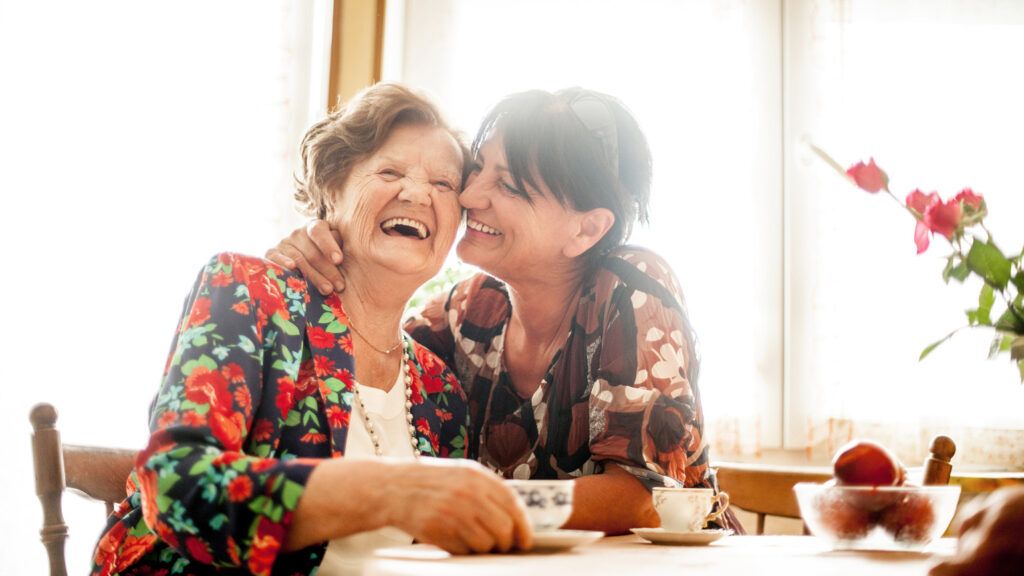Melissa Winberry, MSW, LSW is the Assistant Director of the Rose Centers for Aging Well at Benjamin Rose Institute on Aging
You are a daughter or a son, a spouse or partner, sibling or best friend. Your role is familiar and comfortable. Then your loved one has an accident or is diagnosed with an illness that requires your on-going care, and you’re left wondering, who am I now? Taking on the role of caregiver to a loved one shifts relationship dynamics in challenging and confusing ways. Your lifelong role can easily be turned on its head when the parent who cared for you in your childhood suddenly needs your care, or a spouse exhibits new behaviors due to dementia. Scenarios such as these occur on a daily basis, and the changes they bring about in a relationship paradigm can have a ripple effect of feelings, emotions and struggles.
It’s a good possibility that if you are part of a family system, you’ll find yourself shifting into a caregiving role sometime in your life. If you are female, your chances of being a caregiver are considerably higher. Upwards of 75 percent of all caregivers are female and may spend as much as 50 percent more time providing care than males.
Such a shift generally takes a good deal of getting used to on both sides. Your loved one is not likely to relinquish his or her life care over to you without some pushback. Receiving a diagnosis or having an accident will rock a person’s world. Losing the ability to do things on one’s own and having to depend on others, whether temporarily or indefinitely, goes against our innate desire to be independent. While we all tend to be good at helping, when we are the ones who require the help, a flood of emotions can be released.
When your loved one becomes reliant on you, he or she may react with anger, sadness, frustration and fear. At the same time, you as the caregiver may experience many of these same feelings, but from a very different perspective. Do I have what it takes? Will I have the stamina and patience to handle this? How long will I need to do it? How will I juggle my job, finances and childcare, on top of caring for my mother, brother or spouse?
Plus, the person you love may be undergoing changes and becoming someone unfamiliar to you. Although you may have glimpses of what was, there will be a degree of new and unknown added to the equation. For instance, if your spouse has dementia, you may have to face some challenging behaviors on his or her part. Or if you are caring for a sibling who is receiving cancer treatment, you may feel as if you need to put your life on hold for an extended period to provide support. At the outset of caregiving, we come to this role from a place of love and the familiar relationship we have with the person. As time goes on, however, the role changes, and as with many new things in life, it can be hard to accept.
If you are a spouse caring for a loved one with dementia, it is all right to be scared and frustrated and to simply want your comfortable relationship back, rather than continually managing doctor’s appointments and prescriptions. Honor those feelings, find a way to cope with them. Don’t deny yourself any feeling, as this may only make your situation more difficult. If you are a daughter or son caring for a parent at home after a recent fall or other health issue, you may feel overwhelmed with simultaneously handling childcare, work and now your parent’s care. If you feel overburdened, be honest with yourself about it, and then get support.
The good news is that a wealth of resources are available to help you. If your loved one has Alzheimer’s disease or another type of dementia, the Alzheimer’s Association can be an excellent source of support. The American Cancer Society also has a great deal of information for those managing a cancer diagnosis. Explore disease specific resources like these for useful guidance, and look into caregiver support groups in your area. You can gain strength in realizing you are not alone in coping with caregiver responsibilities.
As with all life challenges, beautiful moments can be found when you’re open to them. Whatever your relationship, you can still take walks in the park with your loved one, share special meals, laugh at funny memories, create art and listen to music together, or simply enjoy spending quiet time with one another.
Caregiving is a journey with ups and downs. Be kind to yourself, reach out for help and respite, share feelings with family and friends, understand that self-care is essential and not optional and remind yourself that your emotions are valid. To find help and respite, consider investigating resources through Family Caregiver Alliance or Benjamin Rose Institute on Aging’s BRI Care Consultation™ program. Caring for a loved one is one of the greatest gifts you can ever give. It is invaluable. Thanks to you, your loved one has the opportunity to continue to live the best life possible, for as long as possible.






